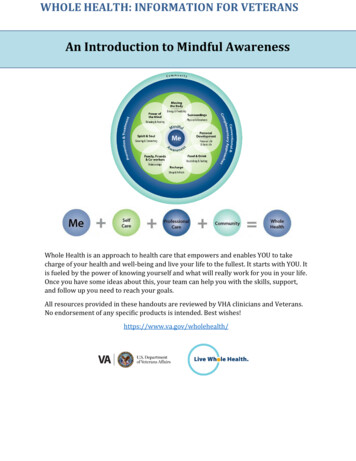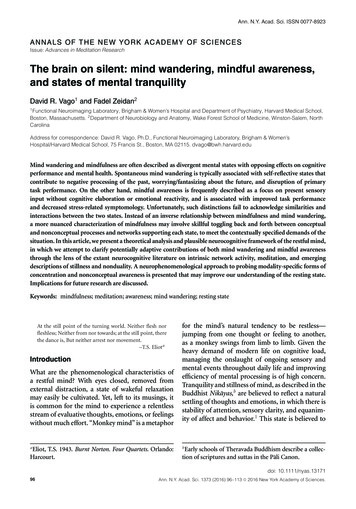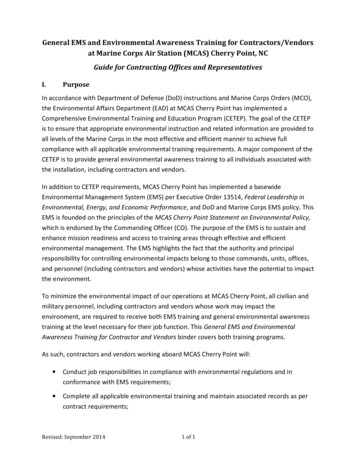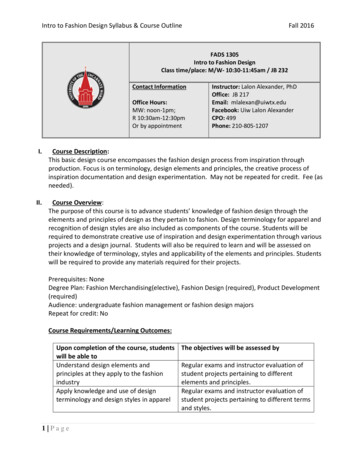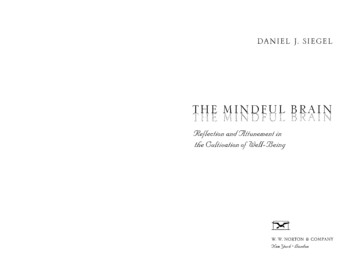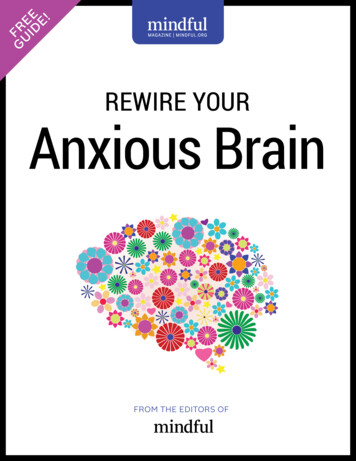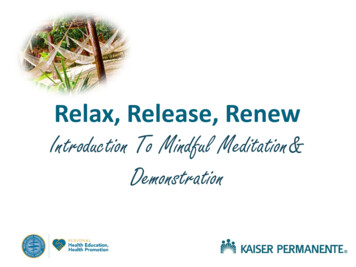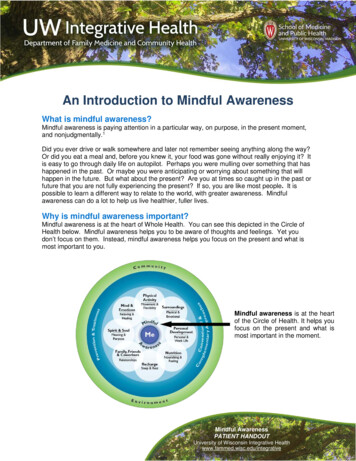
Transcription
An Introduction to Mindful AwarenessWhat is mindful awareness?Mindful awareness is paying attention in a particular way, on purpose, in the present moment,and nonjudgmentally.1Did you ever drive or walk somewhere and later not remember seeing anything along the way?Or did you eat a meal and, before you knew it, your food was gone without really enjoying it? Itis easy to go through daily life on autopilot. Perhaps you were mulling over something that hashappened in the past. Or maybe you were anticipating or worrying about something that willhappen in the future. But what about the present? Are you at times so caught up in the past orfuture that you are not fully experiencing the present? If so, you are like most people. It ispossible to learn a different way to relate to the world, with greater awareness. Mindfulawareness can do a lot to help us live healthier, fuller lives.Why is mindful awareness important?Mindful awareness is at the heart of Whole Health. You can see this depicted in the Circle ofHealth below. Mindful awareness helps you to be aware of thoughts and feelings. Yet youdon’t focus on them. Instead, mindful awareness helps you focus on the present and what ismost important to you.Mindful awareness is at the heartof the Circle of Health. It helps youfocus on the present and what ismost important in the moment.Mindful AwarenessPATIENT HANDOUTUniversity of Wisconsin Integrative Healthwww.fammed.wisc.edu/integrative
How can I better understand what mindful awareness is?You can try the following exercise to get a better sense of mindful awareness.Breath Awareness PracticeSit comfortably with your feet planted firmly on the floor. Explore lengthening your spine,allowing it to stretch out like a string of pearls. Now, for the next two minutes, you are invitedto turn all of your awareness to your breathing. Do not change how you breathe. Just payattention to how it feels to breathe in and breathe out and to the pauses between yourbreaths.How easy was it to focus your attention on your breathing for two straight minutes?Consider taking two additional minutes to repeat the exercise. This time, when yourthoughts wander away from your breath, gently return your attention to your breathing. If ajudgment arises, simply notice that this is a thought. Then bring your attention back to yourbreathing. When your mind wanders, be gentle with yourself. All of our minds wander.That’s what minds do. It’s OK. When you notice your mind wandering, simply bring yourattention back to your breath.You have now practiced mindful awareness. Do not be concerned if you had troublecompleting the exercise above without distractions or judgments. Mindful awareness growswith practice. Over time and with practice, it can become easier and more natural.How can I learn to be more mindful?You can practice mindful awareness on your own as you go about your daily life. Or you cantake a class. Taking a class provides several benefits. You commit time to practice. A teacheris available to answer questions that come up as you practice. And you hear what works forothers. Two well-known classes are mindfulness-based stress reduction (MBSR) andmindfulness-based cognitive therapy (MBCT). Mindfulness-based stress reduction (MBSR). Jon Kabat-Zinn, PhD, developedMBSR in 1979. His goal was to help patients with stress, chronic pain, and illness.MBSR trains people in mindfulness meditation. It helps them use it for the challengesand adventures of everyday life.2 MBSR is an eight-week program—a total of 31 hours.MBSR includes meditation, mindful movement, group discussion, and practice at home. Mindfulness-based cognitive therapy (MBCT). MBCT is an eight-week classdesigned to prevent relapse in people who have recovered from depression.3 It involves31 hours of training. MBCT can show you how your mood and the way you think mayhelp cause depression and trigger relapse. In MBCT you learn to recognize early signsof relapse. You can then turn away from negative moods and thoughts before theybecome severe.Mindful AwarenessPATIENT HANDOUTUniversity of Wisconsin Integrative Healthwww.fammed.wisc.edu/integrative2 of 6
Whether you practice mindful awareness on your own or take a class, you may be interested inaudio files to help you practice. See the resources at the end of this document for some links toaudio files.Can I be too old to learn mindful awareness?Mindful awareness can be helpful to people of any age. Overall, older adults have been foundto be more mindful than younger adults.4 So, practicing mindful awareness may be morenatural for them.5 In the past few years, some studies have especially focused on MBSR andMBCT for older adults. A review of 15 studies found that most older adults liked the classes andfound them helpful.5 The classes especially helped with anxiety, depression, stress, anddealing with pain.Are there any concerns I should know about if I want to practicemindful awareness?In general, mindful awareness is a safe practice. As with any new practice, some people mayinitially feel uncomfortable. For most people the benefits far outweigh any harm. Some peoplefeel a bit of emotional distress when first starting mindful awareness practice. This can occur asyou become more aware of your behaviors, emotions, and thoughts. If you have a mentalhealth challenge such as strong anxiety, a psychotic disorder, or severe posttraumatic stressdisorder (PTSD), it is important to practice under the guidance of a professional.In general, what are the benefits of mindful awareness?Mindful awareness can help you live your life more fully, with all its joys and challenges. Ingeneral, mindful awareness may Improve the quality of your life by helping you experience more moments of your life. Help you see things as they really are, by observing—but not judging—yourexperiences.What other studies have been done?Studies are being done to learn how helpful mindful awareness is for specific conditions. Manystudy results are promising. Mindfulness meditation is the form of mindful awareness that isstudied most often. Research continues. Some important findings are listed below.Physical Body Mindfulness meditation led to longer periods of relaxation.6 Meditation increased activity in the part of the brain linked to positive mood.7Immune System Mindfulness training strengthened the body’s immune system. (These are parts thatprotect the body and fight disease).8-10Mindful AwarenessPATIENT HANDOUTUniversity of Wisconsin Integrative Healthwww.fammed.wisc.edu/integrative3 of 6
Mental Health Mindfulness training reduced mental health symptoms in people with a number ofdifferent chronic diseases.11-13 Mindfulness training decreased symptoms for patients with depression and anxiety.14-16 MBCT helped to prevent relapse in people who had major depression.8,17-19 In onestudy, MBCT helped 75% of people with a history of major depression to get off andremain off their medication.19 Findings were mixed for PTSD. In one study, the PTSD symptoms of combat Veteransimproved following MBCT.20 MBSR did not reduce PTSD symptoms in some studies,but did in others.21,22 One of these studies found that MBSR helped Veterans with PTSDfunction better.22 Also, their depression symptoms decreased. However, MBSR did notreduce other symptoms of PTSD.22Chronic Pain Findings were mixed for chronic back pain. Some studies showed improvement followingMBSR and others did not.23 One study found that MBSR decreased pain intensity,disability, and medication use.23 It improved sleep. Again, research found mixed results for patients with fibromyalgia.24,25 One study foundlarge improvement in many fibromyalgia symptoms following MBSR.24Other Findings Mindful awareness assists with the treatment of alcohol and substance misuse.26 MBSR reduced irritable bowel symptoms in a study of Veterans.27For you to consider: Do you want to explore mindful awareness further? Is this something you want to workon?Is there anything in particular that grabs your attention in this handout?Are you interested in taking a MBSR class?Have you had clinical depression? If so, are you interested in learning more aboutMBCT?For some ways to practice mindful awareness on your own, see the handout “MindfulAwareness Practice in Daily Living.”The information in this handout is general. Please work with your health care team to usethe information in the best way possible to promote your health and happiness.For more information:ORGANIZATIONRESOURCESWEBSITEUniversity ofWisconsin IntegrativeHealthA variety of handouts onmindful esources/modules/Mindful AwarenessPATIENT HANDOUTUniversity of Wisconsin Integrative Healthwww.fammed.wisc.edu/integrative4 of 6
UW HealthMindfulness ProgramMindfulness classesand guided This handout was adapted for the University of Wisconsin Integrative Health Program from the originalwritten for the Veterans Health Administration (VHA) by Charlene Luchterhand MSSW, Education andResearch Coordinator, Integrative Health Program, University of Wisconsin Department of FamilyMedicine and Community Health. It is based in part on an overview for clinicians, Mindful Awareness,written by Adrienne Hampton, MD.6/21/2019References1.Kabat-Zinn J. Wherever You Go, There You Are: Mindfulness Meditation in Everyday Life. New York:Hyperion; 1994.2. University of Massachusetts Medical School Center for Mindfulness in Medicine, Health Care, andSociety. History of MBSR. ry-of-mbsr/.Accessed March 30, 2016.3. University of Massachusetts Medical School Center for Mindfulness in Medicine, Health Care, andSociety. MBCT - Mindfulness-based cognitive therapy. Accessed March 30, 2016.4. Hohaus LC, Spark J. Getting better with age: do mindfulness & psychological well-being improve inold age? Eur Psychiatry. 2013;28(Suppl 1):1.5. Geiger PJ, Boggero IA, Brake CA, et al. Mindfulness-based interventions for older adults: a review ofthe effects on physical and emotional well-being. Mindfulness. 2016;7(2):296-307. doi:10.1007/s12671-015-0444-1.6. Cahn BR, Polich J. Meditation states and traits: EEG, ERP, and neuroimaging studies. Psychol Bull.2006;132(2):180-211. doi: 10.1037/0033-2909.132.2.180.7. Davidson RJ, Kabat-Zinn J, Schumacher J, et al. Alterations in brain and immune function producedby mindfulness meditation. Psychosom Med. 2003;65(4):564-570.8. Grossman P, Niemann L, Schmidt S, Walach H. Mindfulness-based stress reduction and healthbenefits. a meta-analysis. J Psychosom Res. 2004;57(1):35-43. doi: 10.1016/s0022-3999(03)005737.9. Creswell JD, Myers HF, Cole SW, Irwin MR. Mindfulness meditation training effects on CD4 Tlymphocytes in HIV-1 infected adults: a small randomized controlled trial. Brain Behav Immun.2009;23(2):184-188. doi: 10.1016/j.bbi.2008.07.004.10. Witek-Janusek L, Albuquerque K, Chroniak KR, Chroniak C, Durazo-Arvizu R, Mathews HL. Effect ofmindfulness based stress reduction on immune function, quality of life and coping in women newlydiagnosed with early stage breast cancer. Brain Behav Immun. 2008;22(6):969-981. doi:10.1016/j.bbi.2008.01.012.11. Bohlmeijer E, Prenger R, Taal E, Cuijpers P. The effects of mindfulness-based stress reductiontherapy on mental health of adults with a chronic medical disease: a meta-analysis. J PsychosomRes. 2010;68(6):539-544. doi: 10.1016/j.jpsychores.2009.10.005.12. Niazi AK, Niazi SK. Mindfulness-based stress reduction: a non-pharmacological approach for chronicillnesses. N Am J Med Sci. 2011;3(1):20-23. doi: 10.4297/najms.2011.320.Mindful AwarenessPATIENT HANDOUTUniversity of Wisconsin Integrative Healthwww.fammed.wisc.edu/integrative5 of 6
13. Hempel S, Taylor SL, Marshall NJ, et al. Evidence Map of Mindfulness. VA Evidence-basedSynthesis Program Reports. Washington (DC): Department of Veterans Affairs (US); 2014.14. Hofmann SG, Sawyer AT, Witt AA, Oh D. The effect of mindfulness-based therapy on anxiety anddepression: a meta-analytic review. J Consult Clin Psychol. 2010;78(2):169-183. doi:10.1037/a0018555.15. Ramel W, Goldin P, Carmona P, McQuaid J. The effects of mindfulness meditation on cognitiveprocesses and affect in patients with past depression. Cognit Ther Res. 2004;28(4):433-455. doi:10.1023/B:COTR.0000045557.15923.96.16. Jain S, Shapiro SL, Swanick S, et al. A randomized controlled trial of mindfulness meditation versusrelaxation training: effects on distress, positive states of mind, rumination, and distraction. Ann BehavMed. 2007;33(1):11-21. doi: 10.1207/s15324796abm3301 2.17. Piet J, Hougaard E. The effect of mindfulness-based cognitive therapy for prevention of relapse inrecurrent major depressive disorder: a systematic review and meta-analysis. Clin Psychol Rev.2011;31(6):1032-1040. doi: 10.1016/j.cpr.2011.05.002.18. Ma SH, Teasdale JD. Mindfulness-based cognitive therapy for depression: replication andexploration of differential relapse prevention effects. J Consult Clin Psychol. 2004;72(1):31-40. doi:10.1037/0022-006x.72.1.31.19. Kuyken W, Byford S, Taylor RS, et al. Mindfulness-based cognitive therapy to prevent relapse inrecurrent depression. J Consult Clin Psychol. 2008;76(6):966-978. doi: 10.1037/a0013786.20. King AP, Erickson TM, Giardino ND, et al. A pilot study of group mindfulness-based cognitive therapy(MBCT) for combat veterans with posttraumatic stress disorder (PTSD). Depress Anxiety.2013;30(7):638-645. doi: 10.1002/da.22104.21. Kearney DJ, McDermott K, Malte C, Martinez M, Simpson TL. Association of participation in amindfulness program with measures of PTSD, depression and quality of life in a veteran sample. JClin Psychol. 2012;68(1):101-116. doi: 10.1002/jclp.20853.22. Kearney DJ, McDermott K, Malte C, Martinez M, Simpson TL. Effects of participation in amindfulness program for veterans with posttraumatic stress disorder: a randomized controlled pilotstudy. J Clin Psychol. 2013;69(1):14-27. doi: 10.1002/jclp.21911.23. Cramer H, Haller H, Lauche R, Dobos G. Mindfulness-based stress reduction for low back pain. asystematic review. BMC Complement Altern Med. 2012;12:162. doi: 10.1186/1472-6882-12-162.24. Grossman P, Tiefenthaler-Gilmer U, Raysz A, Kesper U. Mindfulness training as an intervention forfibromyalgia: evidence of postintervention and 3-year follow-up benefits in well-being. PsychotherPsychosom. 2007;76(4):226-233. doi: 10.1159/000101501.25. Schmidt S, Grossman P, Schwarzer B, Jena S, Naumann J, Walach H. Treating fibromyalgia withmindfulness-based stress reduction: results from a 3-armed randomized controlled trial. Pain.2011;152(2):361-369. doi: 10.1016/j.pain.2010.10.043.26. Karyadi KA, VanderVeen JD, Cyders MA. A meta-analysis of the relationship between traitmindfulness and substance use behaviors. Drug Alcohol Depend. 2014;143:1-10. doi:10.1016/j.drugalcdep.2014.07.014.27. Kearney DJ, McDermott K, Martinez M, Simpson TL. Association of participation in a mindfulnessprogramme with bowel symptoms, gastrointestinal symptom-specific anxiety and quality of life.Aliment Pharmacol Ther. 2011;34(3):363-373. doi: 10.1111/j.1365-2036.2011.04731.x.Mindful AwarenessPATIENT HANDOUTUniversity of Wisconsin Integrative Healthwww.fammed.wisc.edu/integrative6 of 6
Jun 21, 2019 · Mindful awareness is paying attention in a particular way, on purpose, in the present moment, . Meditation increased activity in the part of the brain linked to positive mood. 7
